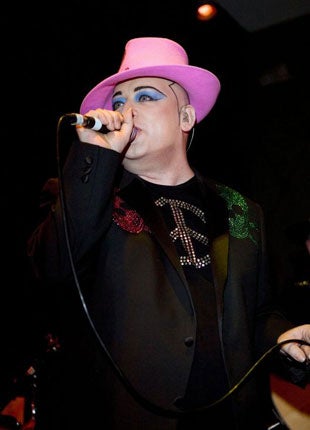Boy George, Pigalle Club, London

"I know sometimes it's easy to get confused," Boy George says, "but this is what I do." The darkness he has requested on stage has finally dropped, and he is singing "If I Could Fly", which twists into the heart of heroin addiction. In his make-up, beard shaved only this morning, he looks like a larger version of the old George the nation loved. His forthcoming sentence for false imprisonment will take its course, but by the time he has finished tonight, I've forgiven him everything else.
The Pigalle's old-fashioned basement supper club isn't his usual venue. He admits to being "very nervous" before starting to sing. But with his mother and old friends in the crowd, he is all nods, winks and laughter. The bitchy, obnoxious Boy seen too often the last 20 years, the heroin addiction and the tabloid hunts, seem less real here than his continuing, reduced pop life. As he sings on "Stranger in this World": "Someone make me a star. Because I sure as hell can't be a man."
The old Culture Club hits cut deeper, with what we know now. "Do You Really Want to Hurt Me" is presented with all court-case irony acknowledged. And how, at the height of his success, did we not hear the desperate George who sings on "Victims": "I feel like a child on a dark night/ I wish there was some kind of heaven"? Or the blank confession of "Karma Chameleon": "I'm a man without conviction"?
His voice is a little deeper and rougher these days, and sometimes swallowed by the band. But he is still one of the few white English male singers to sound soulful. From the spiritual "Down by the Riverside" to the pleading religious imagery of the new disco-gospel single "Yes We Can", he constantly touches on the transcended pain of black American music. Mal Maddock's Hammond organ-style riffs, and backing singer Mary Pearce's booming voice help. But George skilfully skims the surface of his profound material.
Lyrics regularly refer to childhood, and an early life blighted by fear. The encore shows how this became a strength. "That's the Way" is a memoir-prayer poured out to his mother, from as deep a place as George can reach. Then he explains how David Bowie gave him "hope" in early 1970s Eltham. And as he and the crowd sing a moving, celebratory "Starman", you remember just how far this insecure gay man has come, and taken us.
Join our commenting forum
Join thought-provoking conversations, follow other Independent readers and see their replies
Comments
Bookmark popover
Removed from bookmarks